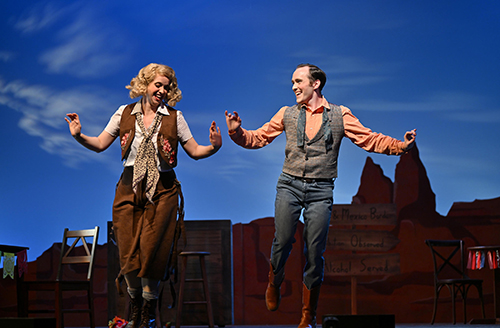by Kevin McLaughlin

Kálmán, who was born in Hungary, always sounds middle European to me, no matter the setting of a particular show or scene. Though the music and setting in Arizona Lady occasionally seem at odds, it’s fun to hear Hungarian-tinged folksong one minute, Viennese tradition the next, and Western cowboy songs the next.
It’s maybe a compliment to Kálmán’s recognizable musical tincture that when “Little Brown Jug” is quoted in the orchestra during one dance sequence (with “London Bridge” as, well, the bridge), it sounds more like Dvořák and not “down homey,” as it might have from another composer.
The excellent program notes reveal that Kálmán consciously wrote Arizona Lady from a desire to emulate Dvořák and to create “an operetta from the New World.” He was inspired too by Giacomo Puccini’s opera The Girl of the Golden West and by a 1949 Broadway musical, Texas Li’l Darlin’, which he and co-librettist Gustave Beer confessed to seeing time and time again. Steven Daigle’s fine translation of the German libretto enhanced Kálmán’s aim, while updating it a bit.
An Arizona ranch in the 1920s is the setting, with the climactic scene at the Kentucky Derby. Ranch owner Lona Farrell (Louisa Waycott), who recently arrived from Hungary (of course), has fired her foreman, Jim Slaughter, for trying to kiss her. Slaughter’s character is given exquisite caddishness by Alexander Spence, one of several actors in primarily speaking roles that add to the show’s charm.
Lona is now left with no one to ride Arizona Lady, her racehorse. The town sheriff, played with Sam Elliott-like economy by Charles Austin Piper — also a speaking role — reminds Lona of the merits of married life (with him, of course). He’s rebuffed, as has become their harmless pattern. With apt operettic timing, it’s at exactly that moment that cowboy Roy Dexter (Jack Murphy) enters the picture, sings a country ballad (though Austria is surely the country), and is hired by Lona on the spot.
Roy vows to not let a spark of mutual attraction with Lona distract him from his new responsibilities in the stable. In a delicious scene he sings a song of appreciation to the filly (“Loving Horse, Splendid Horse”), though in words understandably misconstrued by an eavesdropping Lona.
Jack Murphy was an especially strong Roy, possessing an affable, Gary Cooper-like stage presence and a Bing Crosby-like croon. High notes gave him a little trouble at the start, but after a few minutes he overcame his “fear of heights.” Understatement in speaking and singing rather than projected charisma seemed to be the secret to his success, both with the audience and with Lona.
Waycott (Lona) was also a pleasure to hear. Aside from some tendency toward flatness in the high register, she gave a strong singing performance overall, though she came across a little stiff in the role of Lona. Her brassy Annie Oakley choices landed pretty well at the top of the show, but then a shyer person seemed to take over. Maybe love “took the ginger out of her,” as Anna Russell used to say.
The second couple, Nelly and Chester — played delightfully by Tzytle Steinman and Spencer Reese — had the show’s best comedic moments. Steinman is a born ham and lit up the stage with her country flapper antics.
Matthew Reynolds played Cavarelli, the mind reader and surprisingly prescient fortune teller, with aplomb.
Roy and Lona’s arrangement seems to work out fine until a wealthy and jealous neighbor, Lopez Ibañez (portrayed with fiendish glee by James Mitchell), sabotages the big race. Much is tangled and untangled in the second act, and in the end, we get the prized Viennese “double wedding,” pairing up the couples we have been rooting for. As for the horse, there’s a satisfactory outcome to an exciting Kentucky Derby.
The orchestra, conducted by Wilson Southerland, gave strong support to the singing. Not large, the group sounded much grander for their consistent blend and attention to balance, although intonation occasionally strayed.
Sets and staging were simple but effective, and the lighting added to the show in subtle ways, especially during Roy’s heartfelt outpouring from his country jail cell in Act II.
Sadly, Kálmán suffered a stroke in 1950 from which he never recovered. On October 30, 1953, he passed away in Paris. It was left to father and son, Gustave and Charles Beer, to put the final touches on the music for Arizona Lady, which premiered at the City Theater in Bern, Switzerland in 1954.
Arizona Lady makes for a genuinely entertaining piece of theater. As a fan of Viennese operetta, it’s great to see it added to OLO’s “stable.”
Arizona Lady runs in repertory in Freedlander Theatre at The College of Wooster through July 27.
Published on ClevelandClassical.com July 12, 2023.
Click here for a printable copy of this article



